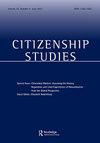公民研究能摆脱公民主义吗?
IF 1.9
3区 社会学
Q3 POLITICAL SCIENCE
引用次数: 0
摘要
本文通过“公民主义”的视角考察了过去25年来公民研究的发展,“公民主义”被理解为国家公民身份的假定优先级,是个人与国家(甚至个人之间)之间可以正式承认的唯一政治关系形式。它表明,虽然公民研究在本质上可能不是公民主义,但使用公民语言来描述广泛的政治关系,使那些使用批判性公民研究核心概念的人面临无意中平庸的公民主义的风险。我首先列出了迄今为止使用的公民主义语言。左派作家用它来描述在现有国家结构内运作的社会民主主义政治运动。我认为,在使用公民主义的各种方式背后,可以被称为“平庸的公民主义”,它假定公民和公民身份的优先权。我将关注公民研究中的一些线索,这些线索试图给传统国家公民的特权带来麻烦,并检查他们在多大程度上成功地逃避了公民主义。我的结论是,尽管批判性的公民研究对我们思考政治的方式做出了重大贡献,但调整所使用的术语可能会使其更加强大。本文章由计算机程序翻译,如有差异,请以英文原文为准。
Can citizenship studies escape citizenism?
ABSTRACT The paper examines the developments in citizenship studies over the past twenty-five years through the lens of ‘citizenism’, understood as a presumed prioritisation of state citizenship as the only form of political relationship between an individual and a state (and perhaps even among individuals) that can be formally recognised. It suggests that while citizenship studies may not be citizenist in nature, the use of the language of citizenship to describe a wide range of political relationships puts those using the core concepts of critical citizenship studies at risk of inadvertent banal citizenism. I start by setting out the language of citizenism as it has been used to date. Writers on the left use it to describe social democratic political movements that function within existing state structures. Underlying the various ways in which citizenism has been used is, I suggest, what can be called ‘banal citizenism’, which presumes the priority of citizens and of citizenship. I will focus on threads within citizenship studies that seek to trouble this privileging of traditional state citizenship and examine the extent to which they succeed in escaping citizenism. I will conclude that while critical citizenship studies has made a significant contribution to how we think about politics, adjusting the terminology used could make it more powerful.
求助全文
通过发布文献求助,成功后即可免费获取论文全文。
去求助
来源期刊

Citizenship Studies
POLITICAL SCIENCE-
CiteScore
3.60
自引率
11.10%
发文量
85
期刊介绍:
Citizenship Studies publishes internationally recognised scholarly work on contemporary issues in citizenship, human rights and democratic processes from an interdisciplinary perspective covering the fields of politics, sociology, history and cultural studies. It seeks to lead an international debate on the academic analysis of citizenship, and also aims to cross the division between internal and academic and external public debate. The journal focuses on debates that move beyond conventional notions of citizenship, and treats citizenship as a strategic concept that is central in the analysis of identity, participation, empowerment, human rights and the public interest.
 求助内容:
求助内容: 应助结果提醒方式:
应助结果提醒方式:


